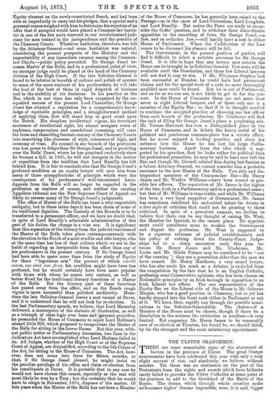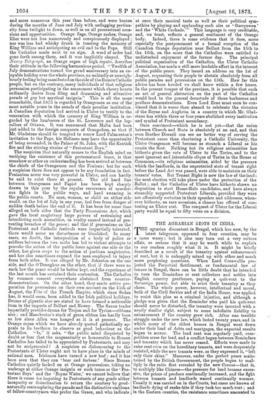THE ULSTER ORANGEMEN.
THERE are some remarkable signs of the abatement of faction in the province of Ulster. The great Orange anniversaries have been celebrated this year with only a very slight amount of riot, and absolutely, we believe, without murder. Yet there was no abstinence on the part of the Protestants from the sights and sounds which have hitherto rarely failed to provoke the Ulster Catholics at some point of the province to add to the bloodshed of the Battle of the Boyne. The drums, which through whole counties make midsummer nights' dreams impossible, were, it is said, bigger and more numerous this year than before, and were beaten during the months of June and July with unflagging pertina- city from twilight to dawn, as well as on all processional ma- dons and opportunities. Orange flags, Orange sashes, Orange lilies were not less numerously and conspicuously displayed ; nor was less bad whisky drunk in toasting the memory of King William and anticipating an evil end to the Pope. Still the Catholics made next to no sign. A word of order had gone forth among them, and it was implicitly obeyed. The Netviy Telegraph, an Orange organ of high repute, describes their attitude in the following harmonious period. "Twelfth of July demonstrations turned the grand anniversary into an en- joyable holiday over the whole province, no unkindly or unneigh- bourly feeling being manifested on the side of the Roman Catholic people, but on the contrary, many individuals of that religious persuasion participating in the amusement which cheery hearts ordinarily derive from fifing and drumming and attractive parade of gay but mystical insignia." This is all the more remarkable, that 1873 is regarded by Orangemen as one of the most notable years in the annals of their peculiar institution. A Canadian deputation had arrived in Ulster to testify to the veneration with which the memory of King William is re- garded by the lumberers of the St. Lawrence and the log- rollers of Ottawa. It was announced that Malta had been just added to the foreign conquests of Orangedom, so that if Mr. Gladstone should be tempted to renew Lord Palmerston's invitation to the Pope, his Holiness may have the opportunity of being serenaded, in the Palace of St. John, with the Kentish fire and the stirring strains of "Protestant Boys."
The suspicion that naturally occurs to the English mind on verifying the existence of this preternatural truce, is that somehow or other an understanding has been arrived at between the chiefs of the Orangemen and the Fenians ; but for such a suspicion there does not appear to be any foundation in fact. Fenianism never was very powerful in Ulster, and can hardly
be said to exist there at present. The old hard line between Orangeman and Papist has been kept sharply drawn to this year by the regular recurrence of murder- ous fights in the public ways, and hard swearing in the public courts. No man, woman, or child on either side could, on the 1st of July in any year, feel free from danger of sudden death before the end of it. It has been for some time alleged on both sides that the Party Processions Act, which gave the local magistracy large powers of restraining and interdicting such assemblies, in reality caused instead of pre- venting breaches of the peace ; and that if processions on the Protestant and Catholic festivals were impartially tolerated, there would occur no disturbance or bloodshed. In many cases, no doubt, the interposition of a body of police or soldiers between the two mobs has led to violent attempts to provoke the action of the public force against one side or the other, has given scope to the action of partisan magistrates, and has also sometimes exposed the men employed to injury from both sides. It was alleged by Mr. Johnston on the one side, and the O'Donoghue on the other, that if there were no such law the peace would be better kept, and the experience of the last month has sustained their contention. The Catholics by common consent everywhere abstained from counter- demonstrations. On the other hand, they made active pre- paration for processions on their own account on the 15th of August, the Fete of the French Empire, which since Sedan has, it would seem, been added to the Irish political holidays. Drums of gigantic size are stated to have formed a noticeable item in the imports of Belfast and Newry. The Saxon trader impartially provides drums for Trojan and for Tyrian—ribbons also ; and Manchester's stock of green ribbon has hardly been so low since Allen was hanged as it is at present. The Orange organ which we have already quoted pathetically ap- peals to its brethren to observe as good behaviour as the Catholics. "Is," it asks, "the public mind disquieted by doubt or fear that the magnanimity so honourable to Roman Catholics has failed to be appreciated by Protestants, and may not be reciprocated ? A suspicion so dishonouring to the Protestants of Ulster ought not to have place in the minds of rational men. Irishmen have turned a new leaf ; and it has been seen that they can bear and forbear.' Since Roman Catholics quietly looked on at Orange processions, taking no umbrage at either Orange insignia or such tunes as the Pro- testant Boys' and the 'Boyne Water,' we cannot believe that there is cause for imputing to Protestants of any grade either incapacity or disinclination to return the courtesy by good- naturedly contemplating the parade and the distinctive emblems of fellow-countrymen who prefer the Green, and who indicate
at once their musical taste as well as their political sym- pathies by playing and applauding such airs as Garryowen and the 'White Cockade.' This language is very creditable,. and, we trust, reflects a general sentiment of the Orange body. Indeed, there is some evidence that it does, more especially the postponement of a formal reception of the Canadian Orange deputation near Belfast from the 15th to' the 16th, on the score that the Catholics were entitled to. undisturbed enjoyment of the former day. The principal political organisation of the Catholics, the Ulster Catholic Association, has made a still more laudable effort in the interest of the public peace. They issued an address on the let of August, requesting their people to abstain absolutely from all public parades and processions on the 15th. How far this advice has been heeded we shall know within a few hours. In the present temper of the province, it is possible that such an act of general abstention on the part of the Catholics would lead to the general desuetude of those barbarous and perilous demonstrations. Even Lord Erne must soon be con- vinced that it is worse than absurd to celebrate the victories, of the Boyne and Aughrim in a country in which Mr. Glad- stone has within three or four years abolished every institution and symbol of Protestant ascendancy.
Once convinced—which he is not yet—that the union
between Church and State is absolutely at an end, and that even Brother Disraeli can see no better way of serving the Protestant cause than chartering a Catholic University, the Ulster Orangeman will become as staunch a Liberal as his. cousin the Scot. Nothing but its religious animosities has hitherto given the vote of Ulster to the Tories, and to the most ignorant and intractable clique of Tories in the House of Commons,—its religious animosities, aided by the pressure which the landlords, in the unprotected state of tenant right before the Land Act was passed, were able to maintain on their tenants' votes. But Tenant Right is now the law of the land;. the next election will take place under the protection of the Ballot ; and the Catholics of Ulster have hitherto shown no disposition to start Home-Rule candidates, and have always- staunchly supported Protestant Liberals, provided they were not offensively sectarian in their speeches and addresses, when- ever hitherto, on rare occasions, a chance has offered of con- testing an Ulster seat. The conquest of Ulster for the Liberal party would be equal to fifty votes on a division.































 Previous page
Previous page